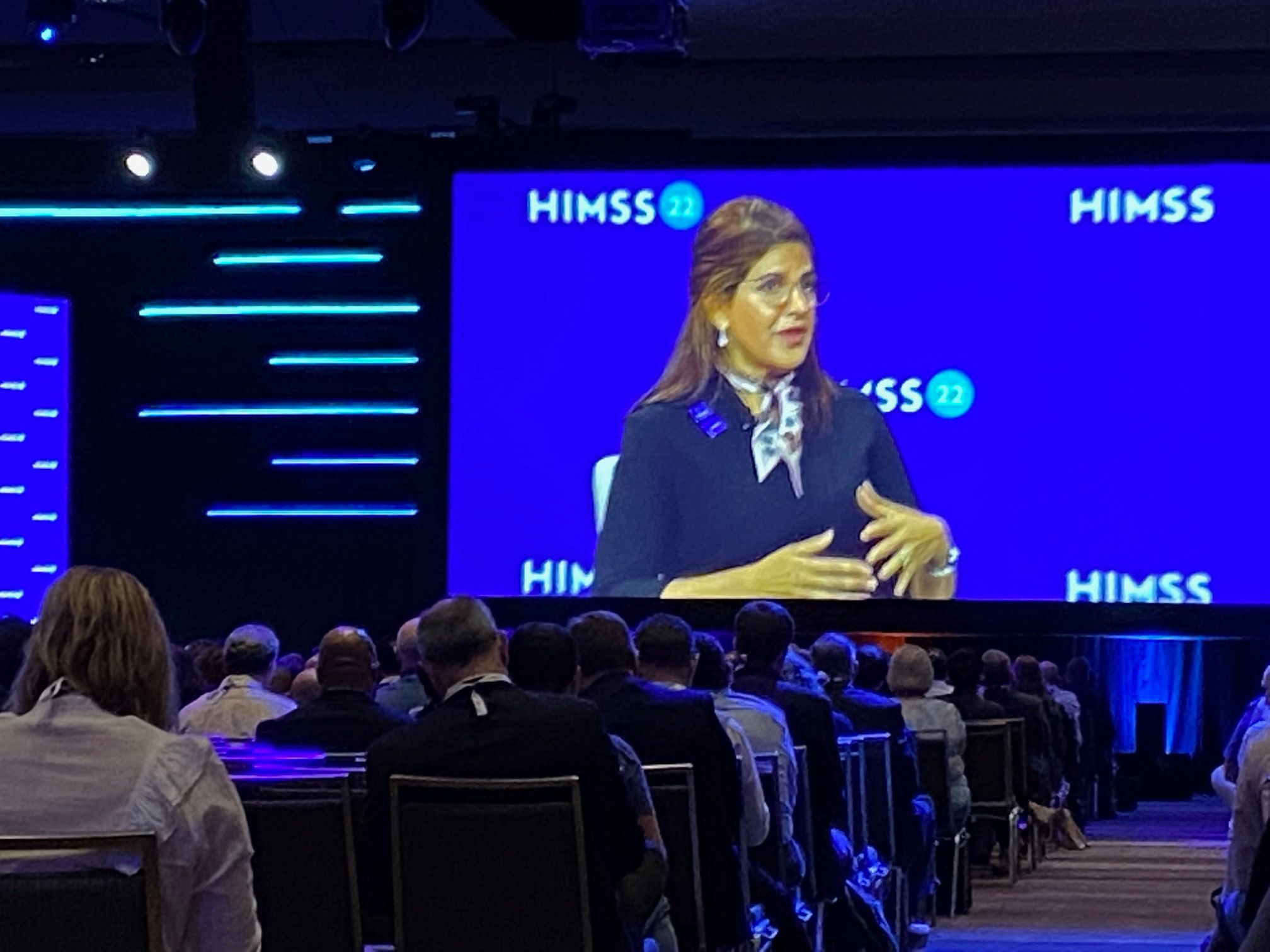HIMSS 2022: Good workers leave hospitals because of bad managers
At a panel moderated by Scott Pelley of ’60 Minutes,’ three top experts said healthcare leaders must show their workers they are truly valued. Otherwise, expect the worker shortage to get worse.
Orlando, Florida - Healthcare leaders have bemoaned a shortage of workers during the COVID-19 pandemic, and that has been a recurring topic at the HIMSS 2022 Global Healthcare Conference & Exhibition.
Tamara Sunbul, medical director of clinical informatics at Johns Hopkins Aramco Healthcare, speaks at the HIMSS 2022 Conference Wednesday.

In the keynote discussion Wednesday morning hosted by broadcast journalist Scott Pelley of “60 Minutes,” leaders on the panel suggested that managers must do a better job taking care of their workers.
Johnny Taylor, president and CEO of the Society for Human Resources Management, spelled out an uncomfortable truth.
“People don’t quit companies and hospitals and facilities,” Taylor said. “They quit their managers.” The audience gave its approval, and Pelley endorsed that observation as well.
For healthcare organizations looking to retain their workers, Taylor offered simple advice.
“Train your people managers better,” Taylor said. “That’s the bottom line.”
Roughly 1 in 5 healthcare workers have left their jobs during the pandemic, according to a study by Morning Consult. The situation could get worse. Another study found that 40% of nurses and more than 20% of doctors plan to walk away from their jobs due to the stress of the pandemic.
Tamara Sunbul, medical director of clinical informatics for Johns Hopkins Aramco Healthcare, talked about the importance of managers demonstrating empathy.
She and others on the panel didn’t discount the importance of compensation. Organizations have to invest in top talent.
But Sunbul and the others on the panel said managers can do more to connect with workers.
“I don’t think we say thank you to people enough,” Sunbul said.
Managers can show appreciation in simple ways, such as showing up on a night shift with hot sandwiches.
Many managers, including those in healthcare, demonstrate a profound lack of empathy, the panelists agreed. Sunbul said workers are given a not-so-subtle message: “Do as you’re told and don’t complain.” Workers who complain fear they could be labeled as “non-resilient,” she said.
Sunbul recalled a situation earlier in her career when she was pregnant and past her due date, and her doctor said it was time for to go to the hospital.
She told her supervisor, who responded by asking if she could stay just a little longer to finish some work.
Taylor talked about the costs to a healthcare organization if a bad manager leads to more people quitting their jobs. Healthcare organizations need to make sure they are promoting people with good skills in managing people, he said.
“Just because someone is a good nurse, doesn’t mean he or she is a great manager of nurses,” he said.
Diane Swonk, chief economist and managing director of Grant Thornton, pointed to the importance of people skills in leadership positions.
Citing a survey, she said, “the number one stresser in people’s jobs: their manager.”
Even as someone who analyzes economic data, Swonk said employers can’t just rely on compensation to keep employees.
“I’m an economist. I study human behavior. It’s not just the numbers that matter,” she said.
Pelley asked the panelists what can be done to rekindle the idea that healthcare is a calling.
Hospitals and healthcare organizations need to engage healthcare workers and find out ways to reduce some burdens so they can concentrate on caring for patients, Sunbul said.
“See what you can do to empower these healthcare professionals to do what they do best,” Sunbul said.
Healthcare leaders also need to talk to their employees and actively listen to their concerns and suggestions for improvement, Sunbul said.
“The people on the floor know how to solve the issues,” she said.
Swonk also pointed out that healthcare leaders need to listen, and they also need to take action when workers say what they need.
“Ask your workers what they need and follow up on it,” Swonk said.
Healthcare organizations can’t underestimate the toll of the pandemic on the mental health of their doctors, nurses and other workers. President Biden has signed legislation to address the mental health needs of healthcare workers and has directed funds to healthcare organizations to address burnout.
Leaders must realize that many of their workers are essentially dealing with post-traumatic stress disorder after caring for patients during the pandemic and watching some of their patients die.
“The workforce is telling us that and it’s a big issue we can’t pay enough attention to,” Taylor said.
Healthcare leaders can help by meeting the needs of their workers. Managers and executives can also reinforce to their employees that they matter, and their work matters.
“What we don’t have is a generation of people managers,” Taylor said.
Hospitals need to invest in strong wellness programs, and they need to create a culture where people know they can speak out.
“People want to feel that they’re cared for, that they’re part of a family, that their voice is heard,” Sunbul said.
Children’s hospitals face complex challenges dealing with disasters
April 18th 2025Pediatric hospitals deal with different factors in weather-related events and other emergencies. Terri Wilson of the Children’s Hospital Association talks about the challenges and the need for more planning and support.
Telehealth faces a looming deadline in Washington | Healthy Bottom Line podcast
February 12th 2025Once again, the clock is ticking on waivers for telemedicine and hospital-at-home programs. Kyle Zebley of the American Telemedicine Association talks about the push on Congress and the White House.